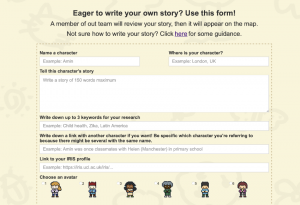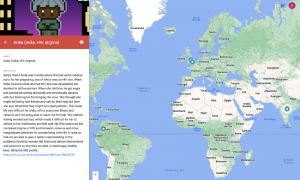THE TEAM
DEPARTMENT
UCL Medical School
WHAT HAPPENED?
WHAT ADVICE OR ENCOURAGEMENT WOULD YOU GIVE TO SOMEONE THINKING OF DOING A CHANGEMAKERS PROJECT?
THE TEAM
DEPARTMENT
UCL Medical School
WHAT HAPPENED?
WHAT ADVICE OR ENCOURAGEMENT WOULD YOU GIVE TO SOMEONE THINKING OF DOING A CHANGEMAKERS PROJECT?
THE TEAM


WHAT ADVICE OR ENCOURAGEMENT WOULD YOU GIVE TO SOMEONE THINKING OF DOING A CHANGEMAKERS PROJECT?
THE TEAM
DEPARTMENT
Anthropology
WHAT HAPPENED?
WHAT ADVICE OR ENCOURAGEMENT WOULD YOU GIVE TO SOMEONE THINKING OF DOING A CHANGEMAKERS PROJECT?
THE TEAM
Staff lead: Dr Keri Wong
Student lead: Henry Wang
Support student: Chloe Wang
DEPARTMENT
Psychology and Human Development, IOE
WHAT HAPPENED?
The link of CUES Study Results Highlights Video: https://mediacentral.ucl.ac.uk/Player/46ebcE0F
WHAT ADVICE OR ENCOURAGEMENT WOULD YOU GIVE TO SOMEONE THINKING OF DOING A CHANGEMAKERS PROJECT?
THE TEAM
Staff: Dr Anne Peasey & Dr Rebecca Lacey
Students: Whitney Wells (lead), Wen Wang (support), Sicheng Hu (support)
DEPARTMENT
Institute of Epidemiology and Health Care
WHAT HAPPENED?
WHAT ADVICE OR ENCOURAGEMENT WOULD YOU GIVE TO SOMEONE THINKING OF DOING A CHANGEMAKERS PROJECT?
THE TEAM
Student leads: Harriet Hunter, Navya Malik, Shannon McCann, Ritika Sukhani
Treasurer and staff project lead: Dominika Dykert
DEPARTMENT
Psychology and Language Sciences
WHAT HAPPENED?
WHAT ADVICE OR ENCOURAGEMENT WOULD YOU GIVE TO SOMEONE THINKING OF DOING A CHANGEMAKERS PROJECT?
THE TEAM
DEPARTMENT
WHAT HAPPENED?
WHAT ADVICE OR ENCOURAGEMENT WOULD YOU GIVE TO SOMEONE THINKING OF DOING A CHANGEMAKERS PROJECT?
THE TEAM
Staff: Dr Alex Elwick
Lead students: Mellissa Seow, Li Diya, Meichen Lu.
Support students: David Curtin, Lin Zilin, Monica Loa Romo, Kathryn O’Brien Skerry, Christina Pham.
DEPARTMENT
Curriculum, Pedagogy and Assessment , IOE
WHAT HAPPENED?
WHAT ADVICE OR ENCOURAGEMENT WOULD YOU GIVE TO SOMEONE THINKING OF DOING A CHANGEMAKERS PROJECT?
THE TEAM
Student head: Nanaki Maitra
Staff lead: Dr Alvina Lai
DEPARTMENT
Institute of Health Informatics
WHAT HAPPENED?
Students: Iba Beyza Yuanyuan Dai (project lead student) Chunjing Li Kateryna Tyzhuk
Staff: Jennifer Chung Eirini Gkouskou Joseph Mintz (project lead staff)
Learning and Leadership, IOE